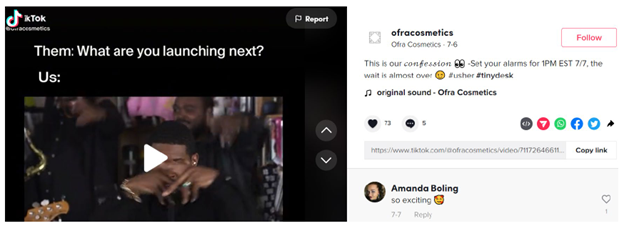The Bottom Line
- Sony Music Entertainment alleges Ofra Cosmetics used Sony recordings without permission in over 300 influencer and brand videos on social media.
- The lawsuit is an important reminder for brands: Just because music is available on a social media platform, doesn’t mean it is authorized for use by brands or their influencers.
Halloween is supposed to be spooky, but this year, Ofra Cosmetics got quite the fright.
On October 31, Sony Music Entertainment sued Ofra for copyright infringement in federal district court in Florida, alleging that Ofra’s unauthorized use of Sony recordings in over 300 social media videos infringes Sony’s copyrights.
Ofra, the buzzy beauty brand known for its cruelty-free, U.S.-made products, is a social media standout. It boasts 1.7 million followers on Instagram and thousands more across its Facebook, TikTok and X accounts. But according to Sony, Ofra’s rise in popularity is attributable, in large part, to its use of world-famous Sony recordings from artists like Britney Spears, Doja Cat and Harry Styles in social media videos – without Sony’s permission.
Influencer Copyright Concerns Strike a Sour Note
Like most brands, Ofra uses its social media pages to announce product launches, host demonstrations, promote giveaways and create brand awareness. Sony objects to the videos that Ofra creates with Sony music, as well as to videos created by influencers for Ofra (typically for cash, commissions or free product) and to videos that are created organically by influencers but reposted by Ofra on its own social pages.
While the lawsuit does not name any influencers as defendants, Sony alleges that Ofra’s direct engagement with influencers forms the basis for contributory and/or vicarious copyright infringement. Specifically, Sony notes that, through Ofra’s Affiliate Program, Ofra has the authority to supervise, suspend and/or terminate influencers that use copyrighted material without permission. It also has the right to monitor influencers’ creation of branded posts and could place conditions, like complying with copyright rights, on the influencers’ right to receive financial benefits under the program.
As for Ofra’s own compliance efforts, Sony says they’re sorely lacking. A September 2022 cease-and-desist letter put Ofra on notice, but allegedly failed to curb the infringements.
False Connections to ‘Confessions’
All this, Sony says, amounts to “blatant, willful, and repeated copyright infringement” that deprives Sony of licensing revenue and its artists of potential sponsorship deals with other cosmetics brands due to their alleged false affiliation with Ofra.
Take, for example, Ofra’s use of Usher’s “Confessions,” where Usher’s image and audio were used in a video announcing an upcoming product launch and Usher’s name and the song title were used in the video’s caption — all without authorization. The result? An undeniably catchy post, but it creates a false affiliation between Sony, Usher and Ofra, according to Sony.

‘Lions and Tigers and Bears’ May Not Scare You, But Copyright Infringement Should
Sony also argues that the musical integrations are hardly coincidental or de minimis. The tracks tend to run the length of the videos and often includes the catchiest part of the tune. In a video from August 2023, a model lip-syncs the well-known chorus of Jazmin Sullivan’s “Lions, Tigers & Bears” to promote an upcoming sale and discount code: “I’m not scared of lions and tigers and bears but I’m scared of … Missing out on the BFF sale.” Ofra allegedly enjoys extra cache from such uses since platforms like TikTok use algorithms that circulate content based on the popularity of trending songs.
Sony Applauds Brands in Tune with Copyright Laws
In the complaint, Sony gives credit to brands playing by copyright rules, noting that other cosmetics companies such as Estee Lauder, Cover Girl, Revlon, MAC, and Shiseido have all inked licensing deals to use Sony recordings in commercials, social media and internet-based media. Presumably, these deals cover not just the videos that the brand itself creates, but also videos created by influencers that are engaged by the brand for promotional purposes.
Sony’s offensive has neither begun, and likely won’t end, with Ofra. In recent years, it has taken formal legal action against players in other industries, from fitness apparel brands (Gymshark) to energy drinks (Bang Energy).
As of the date of this writing, none of the Sony songs at issue in the lawsuit are contained in TikTok’s commercial library. It remains to be seen whether Sony will follow in the steps of Warner Music, which licensed its catalog to the platform’s commercial library in July 2023.
The takeaway for brands: Just because music is available on a social media platform, doesn’t mean it is authorized for use by brands or their influencers. Brands need to be mindful of potential copyright and other intellectual property issues when working with influencers and reposting influencer content to their own pages.